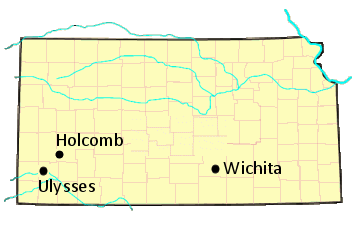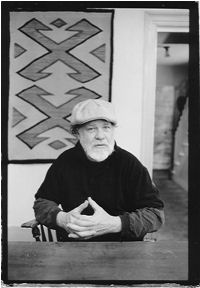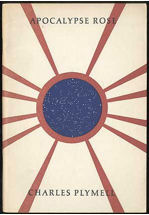 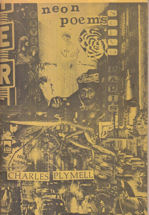
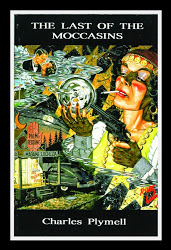 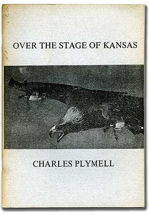
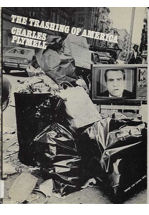 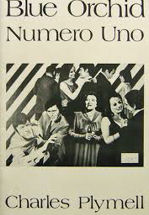
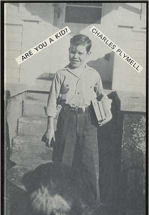 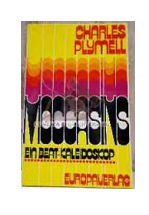 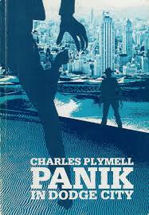 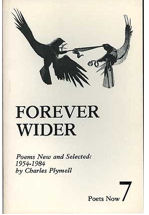 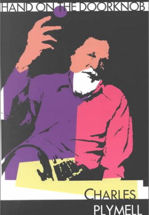 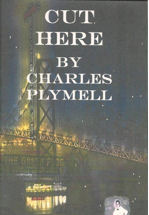 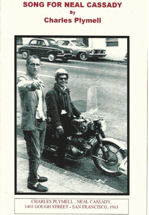 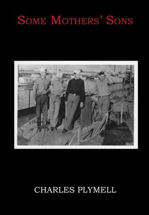 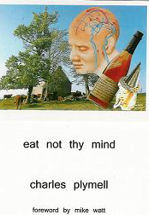 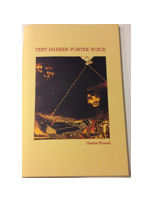 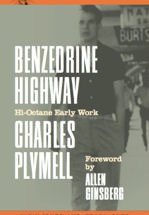 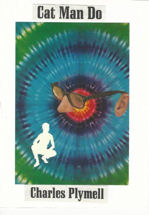 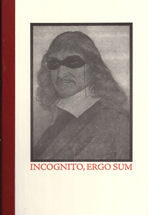 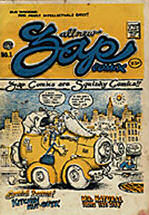
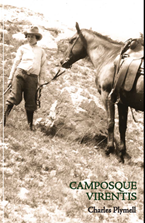 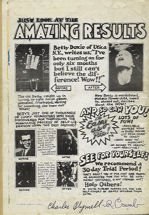
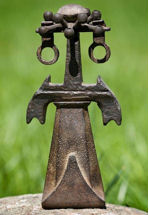 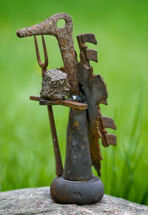
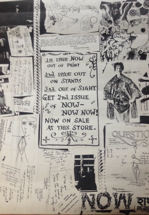 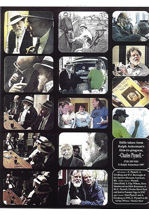
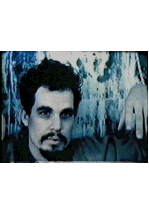 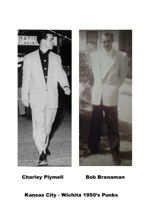
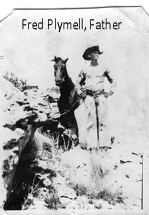 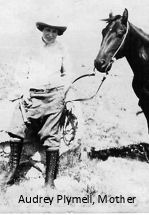
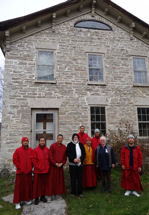
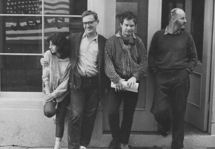
|
| Biography |
|
| |
Charles Plymell was born in Holcomb, Kansas on April 26, 1935. His family later moved to Wichita and Plymell was sent to a military academy in San Antonio, Texas. In 1955 Plymell enrolled at Wichita University where he attended classes and worked as a printer until 1960, without obtaining a degree.
During this time, Plymell began to develop a name for himself in the literary world. While a student at Wichita University, Plymell edited and published Poets’ Corner and Mikrokosmos, two popular campus literary magazines. By 1963 he was living in San Francisco and had published at least five other literary journals. He was the printer of the first issue of Zap Comix, with artwork by Robert Crumb. In 1967 Plymell published his first book, Apocalypse Rose, which was admired by Lawrence Ferlinghetti and Allen Ginsberg, stalwarts of the Beat Generation.
Johns Hopkins University awarded Plymell a fellowship to the Hopkins Writing Seminars in 1970. The Seminars were founded by Dr. Elliott Coleman in 1947, only the second such program in the country. Dr. Coleman, who published 18 volumes of poetry and essays, continued to chair the department until his retirement 30 years later. He was a mentor to many American writers who later gained prominence, including Russell Baker, A&S 1947, who won the Pulitzer Prize for Growing Up, as well as Molly Peacock and Wes Craven.
At that time, Charles began work on The Last of the Moccasins. This novel tells the story of Plymell’s interaction with Beats Allen Ginsberg and Neal Cassady and describes the Wichita counterculture scene. Lawrence Ferlinghetti’s City Lights Books published the novel in 1971. After receiving his MA from Johns Hopkins in 1970, Plymell moved to New York and started Cherry Valley Editions, publishing Allen Ginsberg, William S. Burroughs, and Janine Pommey Vega, among others.
Charles Plymell has written eleven books and appeared in numerous journals and anthologies. He is still actively writing and collaborating with European and American musicians including Andrea Schroeder (who recorded his “Wichita Bebop Blues”), Grant Hart (Husker Du), Thurston Moore (Sonic Youth) and Mike Watt (Iggy and the Stooges.
In 1992, Charles received a Certificate of Recognition from Governor Joan Finney for "...outstanding performance and exceptional contributions to the State of Kansas."
Return to Top of Page |
|
|
Bibliography ( - housed in Thomas Fox Averill Kansas Studies Collection) - housed in Thomas Fox Averill Kansas Studies Collection) |
|
| |
Books:
 Camposque Virentis (Cherry Valley Editions, 2017) Camposque Virentis (Cherry Valley Editions, 2017)- Incognito, Ergo Sum (Ragged Lion Press, 2016)
 Planet Chernobyl (Verlag Peter Engstler, 2015) Planet Chernobyl (Verlag Peter Engstler, 2015)- Cat Man Do (Cherry Valley Editions, 2015)
- Benzedrine Highway (Kicks Books, 2013)
- Animal Light (Verlag Peter Engstler, 2012)
 Tent Shaker Vortex Voice (Bottle of Smoke Press, 2012) Tent Shaker Vortex Voice (Bottle of Smoke Press, 2012)- Curricula Me Vita (Glass Eye Books/Ecstatic Peace/Cherry Valley Editions 2011)
- The Lost Poems of Charley Plymell (M Press, 2010)
- Eat Not Thy Mind (Glass Eye Books/Ecstatic Peace, 2009)
- Beginning Millenium: No More Vinyl Bush War (Glass Eye Books, 2008)
- Neal and Anne on Gough Street (The Beat Scene Press, 2007)
- News (Glass Eye Books, 2007)
 Some Mothers' Sons (Cherry Valley Editions, 2004) Some Mothers' Sons (Cherry Valley Editions, 2004)- In Memory of My Father (Cherry Valley Editions, 2003)
- Cut Here (12 Gauge Press, 2002)
- Song for Neal Cassady (12 Gauge Press, 2002)
- Bennies From Heaven (12 Gauge Press, 2002)
- Rabid Ronnie Rap Back Jive Kansas, 1955 (12 Gauge Press, 2002)
- Reefer Madness in the Age of Apostasy (Butcher Shop Press 2000)
 Hand on the Doorknob (Water Row Books, 2000) Hand on the Doorknob (Water Row Books, 2000)- Journals from Lysidia (Synesthesia Press, 1999)
- Was Poe Afraid? (Bogg Publications, 1990)
- The Harder They Come (Am Here Books 1985)
- Forever Wider, 1954–1984 (Scarecrow Press, 1985)
- Panik in Dodge City (Expanded Media Editions, 1983)
- Moccasins Ein Beat-Kaleidoskop (Europaverlag, 1980)
- Blue Orchid Numero Uno (Telephone Books, 1977)
- Are you a Kid? (Cherry Valley Editions, 1977)
- The Trashing of America (Kulchur Foundation, 1975)
- The Trashing of America Phase 1 (Tuvoti, 1973)
- Over the Stage of Kansas (Telephone Books, 1973)
 The Last of the Moccasins (City Lights Books, 1971; Mother Road Publications, 1996) The Last of the Moccasins (City Lights Books, 1971; Mother Road Publications, 1996)- Neon Poems (Atom Mind Publications, 1970)
 Apocalypse Rose (Auerhahn Press, 1967) Apocalypse Rose (Auerhahn Press, 1967)
Poems:
 Cowboy of the Ancient Sea "In Memory of My Father" and "From Ancient Lands (Vernal Equinox Dream)" - folded broadside - limited edition of 100, first 20 signed by author; this one is signed (Bottle of Smoke Press, 2015) Cowboy of the Ancient Sea "In Memory of My Father" and "From Ancient Lands (Vernal Equinox Dream)" - folded broadside - limited edition of 100, first 20 signed by author; this one is signed (Bottle of Smoke Press, 2015)
Anthologies:
- Found & Lost Magascene, Vol. 1 / No. 0 & 1 [Contributor], (Back Room/Temple of Man, 2010)
- Editors' Choice III (The Spirit That Moves Us, 1992)
- The World (Crown Publishers, 1991)
- The Age of Koestler (The Spirit of the Wind Press, 1990)
- Second Coming Anthology (Second Coming Press, 1984)
- Planet Detroit (Anthology of Urban Poetry, 1983)
- Turpentin on the Rocks (Maro Verlag, 1978)
- A Quois Bon (Le Soleil Noir, 1978)
- And The Roses Race Around Her Name (Stonehill, 1975)
- Mark in Time (New Glide Publications, 1971)
Return to Top of Page
|
|
|
| Writing Samples |
|
| |
Charles Plymell’s Wichita University Recollections
I was pretty much new to poetry at the time: Alan Russo & Bob Branaman reading Pound in Lounge Lizard joints was my intro to poetry, and later English courses. I don't know what Roxie Powell was writing at the time. We met when we sat alphabetically in a geology class. Glenn Todd was probably a more serious student, a few years ahead. He lived next to Roxie and me (we shared a house). Russo was strictly a university student because his dad was on or associated with faculty programs at Wichita U. Barbital Bob & I were making the transition from hipsters, petty criminal, street types, punks. B. Branaman's calling to printmaking brought him to the university art dept., and he persuaded me to go because he would have been the only non-conformist and wanted my company! Ha! I had dropped out after Freshman year of high school, so the academic experience was totally new to me. B. Bob & my prior education was with hustlers, pimps, pill heads, etc, and our music was from clubs across the tracks we frequented. So my poetry interests and naive attempts at writing it began mostly through English courses and talks with Professor Joanie O'Bryant, folksinger [O’Bryant had an album, Folksongs and Ballads of Kansas, on the Folkways label], and Prof. Bill Nelson, well educated in Literature.
Prof. Nelson delivered great lectures on Hart Crane and said Russo's translations of Catullus were best he'd seen. Russo, being the most literate was not only an inspiration, but he wrote business letters for boxes of peyote for us and gravitated toward our non-conformists lifestyle and squealed with joy being around Prof. Hugh Walpole, the Semanticist, who was in British secret service during World War II and would shock faculty at Prof Corban Lepell's parties with his dirty limericks. [Lepell founded Mikrokosmos in 1958] Walpole went mad and got connected with other mad bookstore owner who was in U.S. intelligence, and whose work I published in NOW NOW NOW.
Against this backdrop I conned myself into the print shop job at nearby Wesley Hospital and adjusted my hours to work my way through college, which was no big expense then. I even made enough to buy a house on Stadium Drive near the U. I had not heard of McClure, Connors, Ginsberg, any poets/artists like that until later.
Glenn knew them and Dave Haselwood and even those from a prior wave from the Vortex to settle in S.F. I printed Poets Corner, named after the place in England, however that is written because I had no originality in things academic and relied on what had been done before, like most academics of creative persuasion. In addition to the issues of Poets Corner, I also printed The Locked Man on the sly while learning how to run the multilith offset press at Wesley Hospital. (And the "DADA" issue that fell apart for Mary Joan Waid, who was the managing editor for the University Magazine, Mikrokosmos that LePell (and Russo?) launched. Cp
Elliott Coleman, Charles Plymell
Plywell's Recollections of His Time at Johns Hopkins
Return to Top of Page
|
|
|
| Links |
| |
The Sunflower Collective Interview (10/28/16)
Cherry Valley Editions
The Charles Plymell Fan Site
Interview with Charles Plymell
"Nobody Rides For Free" by Grant Hart, Video by Laki Vazakas (featuring Charles Plymell)
Beats In Kansas: The Beat Generation in the Heartland
073116 Poet Charles Plymell reads Planet Chernobyl
French Version of Apocalypse Rose
Reality Studio
Blood Shot Bill Sings Charles Plymell BB 7 inch New Design
Blood Shot Bill Sings Charles Plymell
Rain Taxi Article "Charles Plymell: Outlaw Poet"
Batman Gallery Article
Poet's Trail Wichita Kansas
Charles' connection with Plymell Kansas
Quotes about Plymell's recent work (2017)
Return to Top of Page
|
|
|
|

![]() Return to Wichita
Return to Wichita![]() Return to Holcomb
Return to Holcomb![]() Return to KANSAS MAP
Return to KANSAS MAP 